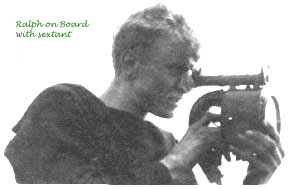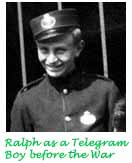

|
|||||
| Ralph Stobart Robson, signalman, life in the British Royal Navy World War Two, sinking of Prince of Wales and the Repulse, Singapore | |||||
|
|||||
|
|||||
|
The night air, as usual in these tropical countries, was full of insects, and bushes here and there could be seen full of glow worms flashing their lights on and off. Walking along the road your nostrils would be assailed with awful stinks as well as the most beautiful and unexpected smells. The southern beaches were the most popular, down to and including Mount Lavinia, but the northern beaches were unused. This was because of a particularly virulent form of malaria-infecting mosquito. I used to get a bus from Colombo. They were like little Bedford buses and you could ride inside or on the roof via a ladder up the side of the bus. When I was off watch during the daytime, a mate and myself used to catch one of these buses to Mount Lavinia. We walked down to the sea for a swim. There was a stretch of water from the beach to the outward reefs, about 100 yards, where the sharks couldn't enter. There was also a little hotel where you could get cups of tea and cakes. One day when I had gone to mount Lavinia by myself, I was returning up the little country lane to the main road when I fell in with a well dressed Singalese in coat and trousers. It turned out he was a professor and in charge of the Marine Laboratories. He asked me if I would like to accompany him home for a cup of tea. He had spent some time in England where he had gone to get a university degree. Over the main road and quarter of a mile onwards we came to a large house surrounded by palm and other trees. He took me inside and introduced me to his wife, who to my surprise turned out to be a white woman. They had three daughters. It appeared that his wife was cut off entirely from the English people living in Ceylon because of the fact that she had married a native Singalese. She was overwhelmed at talking English again as she had only spoken Singalese since leaving England. Her only friends were Singalese. Some time later she asked me with some trepidation what I thought about her marrying a Singalese, and when I succinctly told her my views she greeted me with an enormous smile. We had a marvellous vegetarian meal, as they didn't eat meat. This was my first ever vegetarian meal. I visited them once more for an entire afternoon before I was drafted to Africa. The entrance to the harbour was at the extreme north end and entering form the sea you could sail straight into the harbour's only dry dock at Kotchicadee. This was flooded by the harbour waters and could only take smaller vessels. Right beside it was a small naval barracks. After some time at the girls' school I was moved to the Maritime Laboratories, which was at the south end, about a mile from Colombo and quite close to Mount Lavinia. This took only a small number of ratings. By now the flood of ratings from Singapore had reduced and things were on a more even keel. By this time we were employed at the Naval Base which was situated in a block of offices and shops in the centre of Colombo. It was approached by a tunnel which sloped down under the buildings and which had a naval guard at the far end. My job was to sit down beside the telephone operator. He was an ex-Singalese postmaster who had worked on the east coast and retired to Colombo. A highly intelligent man and bright as a button. He worked the telephone system in the offices that were in use by the navy and made all communications to places outside Colombo, such as Trincomalee, by Morse code. He was the only man I knew who could sit and carry out intelligent conversations whilst transmitting or receiving Morse code messages. About this time we were asked to submit claims for any back pay. I decided to try to get something for nothing out of the navy. I hoped that my pay records had gone down with either the Prince of Wales or the Repulse, so I told them I had received no pay since leaving England, except for odd amounts in Singapore. This caused considerable commotion in the Pay Office, but when I told them I was receiving my full pay as an ex-civil servant the chap I was dealing with seemed remarkably impressed. Events proved that I was quite right and I was never asked for the repayment of any monies advanced by the navy. I received wages in full from Britain to Singapore and in addition I was given the full amount to replace my kit. The sum total was over £70. Unfortunately this sum lasted just over three weeks. Most of it was spent on drink and I hoped that future affairs would sort themselves out. I had met a sergeant who introduced me to the local sergeant's mess and I had also met a Singalese who was the Commander in Chief's driver. So, on the nights when I wasn't at the sergeant's mess I was out with the C in C's driver. Whilst at the Maritime Laboratories we were sent down one day to Kotchicadee dock. We were to be transported to an aircraft carrier, the Hermes, where we were expected to clean the boilers. Normally the boilers would be shut down completely before cleaning, but in this case half were kept fired. We chipped all the scale off the boilers, one boiler at a time, at fifteen-minute intervals, which was the longest time that people could stand due to the heat. It was ghastly and we only stuck it for half a day before being replaced by another shift of men. We crawled up onto the decks, naked and black. I never felt more like jumping in the sea. We returned to the little barracks for a thorough wash. Nobody ever thanked us for this task. The carrier went round the coast and on the same day that the airman crash-landed (see below) she was also sunk. During this time at the Maritime Laboratories I was walking on Easter Sunday morning to work at the telephone exchange. About halfway between the laboratories and Colombo the air raid siren went off. To my amazement I saw a British Hurricane fighter in the process of attacking three Japanese planes. They were all over the sky, but eventually he shot down one of the Japanese planes and then crash-landed on the green sward between Mount Lavinia and Colombo. I ran like hell to the plane and was greeted by a hopping mad British aviator. "Where the hell are we?" he said, and I told him. "Look," he said, "I must get back to the base. Will you keep an eye on the plane until I get time to send somebody back?" Eventually an RAF sergeant came on a motorbike. There was a large crowd of people by then, but fortunately I couldn't understand a word they said and vice versa. It was great to order them away armed with my brief authority, although they were very law-abiding citizens. The sergeant thanked me and I carried on to the telephone exchange. There I was greeted by an infuriated CPO who asked me where the hell I had been. Drawing myself to my full height I looked down at him and said, "Chief, I was ordered by a higher commander than yourself to stand by the plane he had just crash-landed on the green between Mount Lavinia and Colombo, so I bowed to his request." I said this with a large grin. He smiled back and said "You cheeky bastard! Get back to your post." Shortly afterwards we were moved from the laboratories to Kotchicadee docks where there was a small naval base. There we were to act as guard over an old British cruiser, H.M.S. Dragon, a quaint old-fashioned vessel armed with 7-inch guns. She had been built before the 14-18 war and was the sister ship to such other ships as the Danae and Durban. Her crew was going on leave to Kandy in the middle of the island. The ship was a floating farmyard and there were pets of all sorts on board which I was given charge of. There were dogs, cats, 3 or 4 goats, the skipper's hens and a myriad of other creatures. I had to see that all the animals were fed, watered and cleaned and was given strict instructions from the skipper before they all departed on leave. I would sooner have gone to Kandy, but was quite pleased with the animals. My watch mates didn't know B from bull's foot. The skipper and crew returned and I had to wait until the skipper had carried out an inspection. He was highly delighted and told the ship's bosun to provide me with a tot, which I hadn't had since before leaving Singapore. One day I was walking down a street in Colombo when I spotted a familiar face. It belonged to an officer in the Malayan Volunteer Naval Reserve. I had occasionally seen him at the Signal Station in Singapore where he worked. I froze. This was one of the men who had abandoned us. Upon seeing me the officer hesitated. A tide of resentment rose as I eyed him. I hoped that he didn't expect me to salute him because I didn't think I could bring myself to do it. The officer slowly came across and regarded me with incredulity. "Do you remember me?" he asked. "Yes sir," I admitted. "I'm very pleased to see that you got away from Singapore," he said. The words, "No thanks to you," stuck in my throat, but he read them in my expression and actually blushed! Obviously embarrassed he apologised for leaving us in such a predicament, claiming that he had not been aware that we had been left behind until long after they were all in the boat. The real responsibility, of course, lay with the officer in charge of the signal station, the infamous 'Fox's Tail'. When challenged about it, he had claimed that the sudden evacuation left him no time to inform the personnel on watch. Having to wait for them would have caused 'unnecessary delay'. The officer seemed sincere. He had been a rubber planter until recently joining the Reserve and his concern appeared genuine. To my surprise he shook hands with me right there in the street and wished me luck. It had been an unexpected encounter. I did not see him again, nor did I ever meet up with 'Fox's Tail', which is just as well. |
|||||
|
|||||
